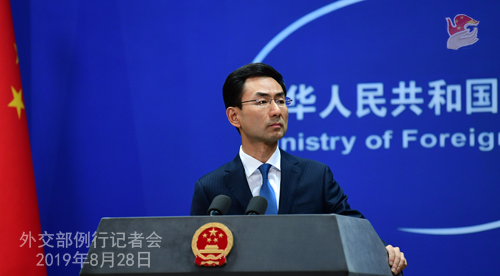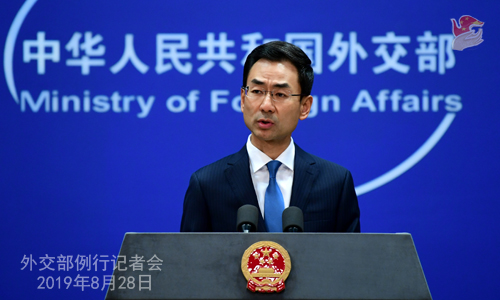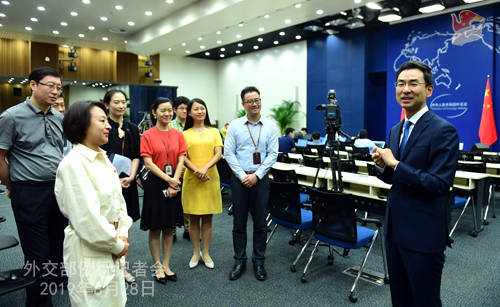| Foreign Ministry Spokesperson Geng Shuang's Regular Press Conference on August 28, 2019 |
| 2019-08-28 18:13 |
|
Q: Can you tell us why the Chinese government has refused to grant permission for a US navy ship to visit Qingdao, which the US military has announced within the last few hours? A: I am not aware of that and would like to refer you to the PLA. Q: Recently the US government claimed repeatedly that China failed to take effective measures to stop the flow of fentanyl into the US and that China is the main source of fentanyl-like substances in the US. Do you have a comment on that? A: The Chinese government attaches high importance to counter-narcotics efforts. It maintains a zero-tolerance attitude towards drugs and strictly enforces anti-drug policies. It exercises stringent control over fentanyl-like substances. So far it has scheduled 25 fentanyl-like substances and two precursors, which is longer than the UN list. On May 1, China started class scheduling of all fentanyl-like substances. It shows the government's resolution to safeguard the Chinese people's safety and health, as well as its sense of responsibility in taking part in global counter-narcotics efforts to maintain world security and stability. Since the class scheduling came into force, we have been working hard on all fronts. Legal documents have been formulated, a nation-wide campaign has been conducted to address the issue, and special operations have been organized to crack down on online sales of fentanyl-like substances. Logistic companies are urged to observe three policies: requiring real customer names, opening packages to check contents, and conducting security machine checks. In particular, high-risk international packages at key customs checkpoints are carefully screened. Besides, we are speeding up efforts to set up drug labs and strengthening efforts to raise public awareness. All these specific measures have ensured earnest implementation of the class scheduling. As a result, we have made significant progress. In 2019, not a single case involving illegal manufacturing, sale and trafficking of fentanyl-like substances has been found by China's counter-narcotics law-enforcement agencies. According to data from the US Department of Justice, in the first quarter this year, US Customs and Border Protection only seized 0.29 kilograms of fentanyl-like substances in 12 cases, down by 99 percent and 93 percent respectively compared to the same period last year. In the second quarter, 5 kilograms were seized in 4 cases, down by 78 percent and 97 percent respectively. The US alleges that China is the main source of fentanyl-like substances in the US. That is groundless and false. Fentanyl-like substances for medical use legally produced by Chinese factories have never flowed into the US. China's law-enforcement agencies did handle cases involving illegal processing of fentanyl products for US markets. With cross-border collusion, these substances were disguised or hidden in international packages mailed to the US. The amount involved is very limited. The main reason for the US fentanyl crisis lies in a prevalent tradition of prescription painkiller abuse. With 5 percent of the world's total population, the US consumes 80 percent of the global opioid medication. If the US really wants to solve its fentanyl problem, it should put its own house in order. The manufacturing, sale and abuse of fentanyl-like substances is a global problem that needs to be jointly tackled by all countries. The US should respect facts, view China's efforts objectively and stop shifting blames. It should step up regulation at home to effectively address the manufacturing, sale and trafficking of these substances. The Chinese government stands ready to deepen cooperation with the US and other countries to advance joint management of these substances and solve the abuse problem.
Q: After China formally arrested Yang Jun on espionage charges a few days ago, Australian Foreign Minister Payne issued a statement. We know you stated China's position yesterday, but with the Australian media keenly following this and all those reports and speculations, do you have any further comments? A: I stated China's position yesterday. The case is still being handled. The national security organ handles the case according to law and fully guarantees Yang's rights. The remarks by some in Australia are baseless and irresponsible. I would like to reiterate that China is a country with rule of law. We urge the Australian side to respect China's judicial sovereignty, to stop hyping up the issue and pressuring China, and to stop interfering in any way in China's lawful handling of the case. Q: We learned from media reports that Mexican law enforcement officials recently seized more than 23 tons of fentanyl from China bound for the US in Mexico's biggest port. Can you comment on that? A: We noted the reports. Paying high attention to this, the Chinese authority started investigation right away and contacted the US and Mexican sides for verification. Both countries confirmed that the items in question were not fentanyl. The Chinese counter-narcotics authority is doing all it can to investigate this case. Any company or individual found guilty will be punished according to law. We will keep you updated on the result of our investigation. Q: Australia moves to counter foreign influence at its universities, establishing a new task force to help protect sensitive research, cyber defenses and free speech, with many saying that this was aimed at China's infiltration and influence. Does China have any comment? A: As we responded to many similar questions before, "China's infiltration in Australia" and other accusations simply have no basis at all. Practical cooperation and people-to-people exchange between China and Australia on the basis of mutual trust and mutual benefit have boosted our mutual understanding and met the interests of both. Politicizing educational cooperation and setting up obstacles will do no good and gain no popularity. We hope Australia will view its cooperation with China in an objective manner, cherish the outcomes and make more efforts towards boosting friendship and trust between our two countries. Q: Before visiting Ukraine, US National Security Adviser Bolton said to the media that China seeks to expand its economic influence worldwide through the Belt and Road Initiative and other attractive investments, and that he will inform friends and partners about the dangers that Chinese investments bring. I wonder what is China's comment? A: We firmly oppose Mr. Bolton's attempt to smear BRI cooperation and to drive a wedge between China and other countries. However, his comment came as nothing new to us. Unlike the "America First" policy pursued by some in the US, the principle China upholds in its BRI cooperation with over 160 countries and international organizations is extensive consultation, joint contribution and shared benefits, which has produced mutually beneficial results. It is the same with our cooperation with Ukraine. I believe most countries in the world are capable of making independent, fact-based policy choices that are in their own interests.
|
 |
|


